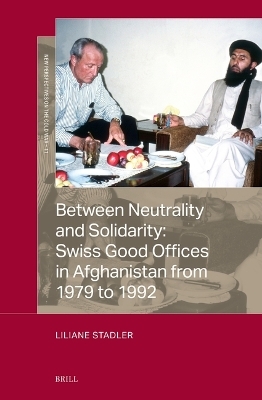
Between Neutrality and Solidarity: Swiss Good Offices in Afghanistan from 1979 to 1992
Seiten
2024
Brill (Verlag)
978-90-04-69065-3 (ISBN)
Brill (Verlag)
978-90-04-69065-3 (ISBN)
After the Soviet invasion of Afghanistan, the Swiss government oscillated between neutrality and solidarity in one of the Cold War’s major hot wars. They delivered humanitarian aid, hosted Soviet prisoners and eventually mediated between the Afghan regime and the resistance.
After 1979, Switzerland became increasingly involved in Soviet-occupied Afghanistan as a provider of humanitarian aid and good offices. It delivered aid to the region, hosted Soviet prisoners of war and eventually mediated between the Afghan regime and the mujahideen. What is puzzling about this development is that initially, following the Soviet invasion, both government and parliament refused to become diplomatically involved in Afghanistan on account of Swiss neutrality.
The present study investigates how and why this changed between 1979 and 1992. While the practical impact of Switzerland’s good offices was modest, the crisis revealed that Switzerland continued to struggle to balance the competing imperatives of permanent neutrality and international solidarity in an increasingly multilateral world.
After 1979, Switzerland became increasingly involved in Soviet-occupied Afghanistan as a provider of humanitarian aid and good offices. It delivered aid to the region, hosted Soviet prisoners of war and eventually mediated between the Afghan regime and the mujahideen. What is puzzling about this development is that initially, following the Soviet invasion, both government and parliament refused to become diplomatically involved in Afghanistan on account of Swiss neutrality.
The present study investigates how and why this changed between 1979 and 1992. While the practical impact of Switzerland’s good offices was modest, the crisis revealed that Switzerland continued to struggle to balance the competing imperatives of permanent neutrality and international solidarity in an increasingly multilateral world.
Liliane Stadler, Ph.D. (2021), University of Oxford, is a lecturer in History of International Relations at the University of Utrecht. Her research revolves around neutral states in multilateral diplomacy and conflict resolution.
| Erscheinungsdatum | 28.02.2024 |
|---|---|
| Reihe/Serie | New Perspectives on the Cold War ; 11 |
| Verlagsort | Leiden |
| Sprache | englisch |
| Maße | 155 x 235 mm |
| Gewicht | 544 g |
| Themenwelt | Geschichte ► Allgemeine Geschichte ► Neuzeit (bis 1918) |
| Geschichte ► Allgemeine Geschichte ► Zeitgeschichte | |
| Geisteswissenschaften ► Geschichte ► Regional- / Ländergeschichte | |
| ISBN-10 | 90-04-69065-4 / 9004690654 |
| ISBN-13 | 978-90-04-69065-3 / 9789004690653 |
| Zustand | Neuware |
| Haben Sie eine Frage zum Produkt? |
Mehr entdecken
aus dem Bereich
aus dem Bereich
Europa 1848/49 und der Kampf für eine neue Welt
Buch | Hardcover (2023)
DVA (Verlag)
48,00 €
Giordano Bruno - ein ketzerisches Leben
Buch | Hardcover (2024)
C.H.Beck (Verlag)
29,90 €


